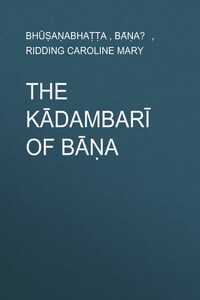Bāṇabhaṭṭa, its author, lived in the reign of Harshavardhana of Thāṇeçar, the great king mentioned in many inscriptions,2 who extended his rule over the whole of Northern India, and from whose reign (A.D. 606) dates the Harsha era, used in Nepal. Bāṇa, as he tells us, both in the ‘Harsha-Carita’ and in the introductory verses of ‘Kādambarī,’ was a Vātsyāyana Brahman. His mother died while he was yet young, and his father’s tender care of him, recorded in the ‘Harsha-Carita,’3 was doubtless in his memory as he recorded the unselfish love of Vaiçampāyana’s father in ‘Kādambarī’ (p. 22). In his youth he travelled much, and for a time ‘came into reproach,’ by reason of his unsettled life; but the experience gained in foreign lands turned his thoughts homewards, and he returned to his kin, and lived a life of quiet study in their midst. From this he was summoned to the court of King Harsha, who at first received him coldly, but afterwards attached him to his service; and Bāṇa in the ‘Harsha-Carita’ relates his own life as a prelude to that of his master.
The other works attributed to him are the ‘Caṇḍikāçataka,’4 or verses in honour of Caṇḍikā; a drama, ‘The Pārvatīpariṇaya’; and another, called ‘Mukuṭatāḍitaka,’ the existence of which is inferred from Guṇavinayagaṇi’s commentary on the ‘Nalacampū.’ Professor Peterson also mentions that a verse of Bāṇa’s (‘Subhāshitāvali,’ 1087) is quoted by Kshemendra in his ‘Aucityavicāracarcā,’ with a statement that it is part of a description of Kādambarī’s sorrow in the absence of Candrāpīḍa, whence, he adds, ‘it would seem that Bāṇa wrote the story of Kādambarī in verse as well as in prose,’ and he gives some verses which may have come from such a work.
Bāṇa himself died, leaving ‘Kādambarī’ unfinished, and his son Bhūshaṇabhaṭṭa took it up in the midst of a speech in which Kādambarī’s sorrows are told, and continued the speech without a break, save for a few introductory verses in honour of his father, and in apology for his having undertaken the task, ‘as its unfinished state was a grief to the good.’ He continued the story on the same plan, and with careful, and, indeed, exaggerated, imitation of his father’s style.
The story of ‘Kādambarī’ is a very complex one, dealing as it does with the lives of two heroes, each of whom is reborn twice on earth.
(1–47) A learned parrot, named Vaiçampāyana, was brought by a Caṇḍāla maiden to King Çūdraka, and told him how it was carried from its birthplace in the Vindhyā Forest to the hermitage of the sage Jābāli, from whom it learnt the story of its former life.
(47–95) Jābāli’s story was as follows: Tārāpīḍa, King of Ujjayinī, won by penance a son, Candrāpīḍa, who was brought up with Vaiçampāyana, son of his minister, Çukanāsa. In due time Candrāpīḍa was anointed as Crown Prince, and started on an expedition of world-conquest. At the end of it he reached Kailāsa, and, while resting there, was led one day in a vain chase of a pair of kinnaras to the shores of the Acchoda Lake. (95–141) There he beheld a young ascetic maiden, Mahāçvetā, who told him how she, being a Gandharva princess, had seen and loved a young Brahman Puṇḍarīka; how he, returning her feeling, had died from the torments of a love at variance with his vow; how a divine being had carried his body to the sky, and bidden her not to die, for she should be reunited with him; and how she awaited that time in a life of penance. (141–188) But her friend Kādambarī, another Gandharva princess, had vowed not to marry while Mahāçvetā was in sorrow, and Mahāçvetā invited the prince to come to help her in dissuading Kādambarī from the rash vow. Love sprang up between the prince and Kādambarī at first sight; but a sudden summons from his father took him to Ujjayinī without farewell, while Kādambarī, thinking herself deserted, almost died of grief.
(188–195) Meanwhile news came that his friend Vaiçampāyana, whom he had left in command of the army, had been strangely affected by the sight of the Acchoda Lake, and refused to leave it. The prince set out to find him, but in vain; and proceeding to the hermitage of Mahāçvetā, he found her in despair, because, in invoking on a young Brahman, who had rashly approached her, a curse to the effect that he should become a parrot, she learnt that she had slain Vaiçampāyana. At her words the prince fell dead from grief, and at that moment Kādambarī came to the hermitage.
(195–202) Her resolve to follow him in death was broken by the promise of a voice from the sky that she and Mahāçvetā should both be reunited with their lovers, and she stayed to tend the prince’s body, from which a divine radiance proceeded; while King Tārāpīḍa gave up his kingdom, and lived as a hermit near his son.








